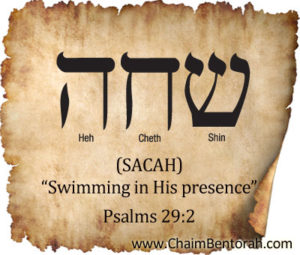HEBREW WORD STUDY – SWIMMING IN HIS PRESENCE – שחה Sine Cheth Hei
Psalms 29:2: “Give unto the Lord the glory due His name, worship the Lord in the beauty of holiness.”
 Oh, how I love to quote this verse as I worship God. I just thrill when I utter the words to God that I am worshipping him in the beauty of His holiness. I get such a blessing from this that I actually hate to figure out what it means. Right now I haven’t the foggiest idea what the beauty of His holiness means. But it sounds wonderful.
Oh, how I love to quote this verse as I worship God. I just thrill when I utter the words to God that I am worshipping him in the beauty of His holiness. I get such a blessing from this that I actually hate to figure out what it means. Right now I haven’t the foggiest idea what the beauty of His holiness means. But it sounds wonderful.
The word beauty in Hebrew is behadrat which means a garment. For this reason, commentators expressed the worship of God in a sanctuary or church where the priest and preachers wear beautiful robes and garments. In fact, it is this verse that serves the basis for priestly garments or robes worn by ministers in a church.
I was discussing this issue with one of my passengers on my disability bus today who is Catholic and attends Mass spoken in Latin. He said he failed Latin in High School but he just loves to hear the sound of the liturgy in Latin even though he has no idea what is being said. Like me not knowing what the beauty of His holiness means (I will by the end of this study or you will not be reading this) but I still sing it out in worship just as my passenger feels he is worshipping God listening and reciting Latin phrases that He doesn’t know what the meaning is. I began to wonder how important it is to really know and understand what you are saying to God to really worship Him. People who pray in tongues have no idea what they are saying but they feel they worship God in doing so. Their spirit knows, just as my friend’s spirit may understand the Latin and my spirit may know what the beauty of His holiness means even though I do not know from an intellectual level. Maybe God is meant to be experienced not understood. If my passenger happens to experience God in the beauty of His holiness who am I to say he is wasting his time sitting in a service where he cannot understand a word that is spoken. After all Jesus said that we worship God in spirit and my client’s spirit probably understands Latin.
There is one problem with applying this word behadrat to garments. It is speaking of the behadrat kodesh the garments of Holiness. When you look at the word holy or kodesh you find it means something sacred, consecrated, or set apart. Maybe a piece of cloth can be consecrated to God, but I suspect God is more interested in our lives being consecrated, sacred and set apart. But who am I to fly in the face of 2,000 years of tradition.
However, let us assume that this garment of holiness or sacredness is really our lives consecrated to God and our bodies as the garment that carries this consecration. What would that mean for us? For one thing, it would mean we could worship Him. Worship has two possible roots, shacah which is to fall prostrate and sacah which means to swim or surround yourself with water. Since the ancient Hebrew does not distinguish between a Shin (sh) and Sine (s) I believe both meanings apply here. I rarely see people fall prostrate in worship, but I do see them standing with arms lifted just basking in the presence of God. I see more sacah swimming or surrounding in the presence of God than shacah falling prostrate.
If the word beauty really means a garment then beauty could be a reference to the covering of your body. The covering of your body in holiness, your body being consecrated or set apart. When you worship God you are allowing God to just cover your body and consecrate you, that is wash away all that sinful crap and make you white as snow. When that happens you can worship Him sacah, that is swim in His presence, surround yourself with His presence as the water surrounds you when you are swimming. I believe that is what it means to worship Him in the beauty of His holiness, he covers all your sins so that He can consecrate you, set you apart from everything that would separate you from Him so he can just drown you in His presence.
Actually, this is where the idea of baptism by immersion as we call it which to the Jews is Mikveh which is an immersion in water by a woman to achieve the ritual of purity after menstruation or childbirth. It is a picture just a picture or illustration of being surrounded by the presence of God to purify you and to worship.
I challenge you to do this. Just hold out your hands like you are holding out your hands to receive a gift. Close your eyes and simply pray: “Come Holy Spirit.” Hebrews 11:1: “Now faith is the substance of things hoped for, the evidence of things not seen.” The word hope in the Aramaic is sabra which means a positive imagination. Faith is the evidence of things not seen. You don’t see it but use your imagination your sabra. Picture in your imagination a cloud descending upon you, a cloud of love, peace, and beauty, imagine it. God gave us imagination, we use it read novels, plan social events and many things, why not use it to imagine God covering you in a cloud of love, swimming in His presence because you know what, that is exactly what is happening you just have to believe it and it will be. That is faith and that is worshipping him in the beauty of His holiness. I know it feels like a mind game, I don’t believe God is into games, He is into faith, believing. He promises to fill you the Holy Spirit if you ask, then just ask and practice faith by sabra, imagining what is not seen. Worshipping Him in the beauty of his holiness is simply letting Him surround you with his love and presence like a cloud, like sachah, swimming in His midst. Just sabra, imagine it and believe it is Him.
We’d love for you to become part of our live Bible studies, Hebrew classes and much more. Click on the picture below to learn more : )








A few months ago I had a dream, in the second scene I was swimming in the sea. A few weeks afterwards I found an ancient Hebrew adage that says, “When you study the scripture, you swim in the sea of Torah.” This is a beautiful confirmation for me. Thanks for sharing.
To everyone. If you Google – Star Trek Metamorphosis you can view this episode. I have never seen a more clear illustration of worship and also what dumb oxen many Christians are who never grasp the purpose and reason for worship, or even why Jesus had to come to us in a human form. I swear many of the writers for those original Star Trek episodes must have been Jewish. Chaim
Thank you I found you study lesson after searching for Hebrew devotionals. I’m on a mission a personal mission to make my relationship with God thru meditation my first act of the day. This was beautiful way to keep swimming whether prostrate or upright. His spirit will meet you on any level. Thank you so much!
This my favorite so far
Sweet and precious. We sing a song. Surround me, O LORD.
I appreciate you teaching on tthis. Thank you
This must mean that when we surrender to the Cross and all that represents Christ our Savior consecrated us to God. He made us sacred and set apart. I never really thought about what Christ did on the Cross in this way precisely. This puts a new spin on my life.
Wow! So beautiful. I do this in the shower. No wonder it’s so meaningful for me. Thank you for the revelation.